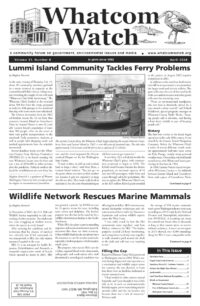by Jeff Riedinger
Editor’s Note: An acquaintance of mine, Jeff Riedinger, told me when we were kids his grandfather was Judge George Boldt, an esteemed judge in the Tacoma area. When the Boldt Decision occurred in 1974, I remembered my young acquaintance and his grandfather, and again at the celebrations for “Boldt at 50.” What follows are Judge George Boldt’s grandson Jeff Riedinger’s remarks at the Northwest Indian Fisheries Commission “Boldt at 50” event hosted by the Muckleshoot Indian Tribe in February 2024.
“Distinguished members of the Northwest Indian Fisheries Commission, tribal elders, leaders, and members, it is my great honor and privilege to speak with you today as we remember my grandfather George Hugo Boldt and his momentous 1974 federal court decision in United States v. Washington.
During my childhood, I was privileged to sit in my grandfather’s courtroom and visit his chambers in the old Federal Courthouse in Tacoma. My grandfather often commented that he had turned down opportunities to be promoted to the Ninth Circuit Court of Appeals. He remained a federal district court judge because he always wanted to be able to see and hear the people involved in the case and impacted by his decisions. Never was this more important than in United States v. Washington.
When my grandfather handed down his decision in United States v. Washington, I was a first-year student in college. I am forever grateful that my grandfather lived long enough to see me graduate from college and law school and marry and to meet his first great-grandchild, my daughter Stephanie.
I am even more grateful for the inspirational role my grandfather has played in my life. During his lifetime my grandfather shared with me stories of leaders who inspired him. After his death, I inherited items that exemplify his admiration for people who provided principled moral leadership in challenging and controversial times and the inspiration he drew from them. These items include:
- a 1940 edition of Carl Sandburg’s six-volume biography of Abraham Lincoln as well as several other biographies of Lincoln, including a 1906 edition of Frederick Trevor Hill’s “Lincoln the Lawyer.”
- a six-volume set of Winston Churchill’s 1948 history of World War II.
- a 1964 memorial edition of John Fitzgerald Kennedy’s “Profiles in Courage.” This book was a gift to my grandfather. The inscription reads “To Judge George Boldt, with the highest esteem of his friend, Bob Kennedy Feb 1964.”
I also inherited one of David Day’s two draft paintings done in preparation for my grandfather’s official portrait. The painting has held a place of honor in my office ever since.
The painting and the books are a daily reminder of my grandfather and a constant source of inspiration in my lifelong work on land rights for rural families in low-income countries.
I cannot speak for my grandfather, but I strongly suspect that he would be disappointed, but not surprised, that 50 years after his ruling there would still be arguments over how best to protect and restore the salmon runs and whether those measures should take priority over dams and other forms of “development.”
I also strongly suspect that he would be pleased, but not surprised, that the tribes continue to take the lead in protecting salmon runs and demonstrating how to restore and sustainably manage those runs and the streams, rivers, forests, and estuaries that are critical to a healthy salmon habitat.
On behalf of my mother and the many members of my family who are present, whether in person or in spirit, I thank the Northwest Indian Fisheries Commission and all of you who are here for honoring my grandfather and his decision. I look forward to further progress in your continuing efforts to preserve your treaty rights and to protect and restore the salmon runs that are so central to your heritage.”




























